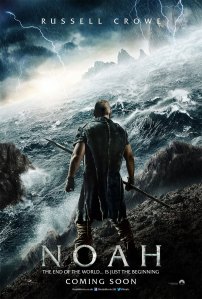After months of controversy Darren Aronofsky’s Noah finally hit theaters this past weekend. There had been concerns over the movie’s biblical accuracy and whether or not it would do a disservice to scripture.
While Noah isn’t 100% biblically accurate, it also isn’t opposed to God.
I enjoyed Noah. It was a well-done, thrilling and thought-provoking movie. Aronofsky is a fantastic filmmaker and he tells a story full of faith, brokenness and redemption. Russell Crowe is captivating as Noah, fully capturing the gamut of emotions involved in being chosen to survive while everyone else dies.
I’m looking forward to watching Noah again, as I spent most of the movie analyzing it instead of simply enjoying it. Here are some thoughts I had while watching Noah.
Biblical Accuracy
Noah is not 100% biblically accurate and I’m all right with that. A completely biblically accurate movie about Noah would be very short and very boring. In the biblical account Noah doesn’t even say a word. The movie would be 10 minutes of Noah building the ark and 5 minutes of him loading the animals and surviving the flood. I don’t expect complete biblical accuracy in a movie. I expect biblical accuracy in the pulpit, not in the theater. I’m more interested in the themes of biblical movies and whether or not those are accurate. Noah touches on themes of sin, God’s sovereignty, the Imago Dei, God’s holiness, creation care, redemption and God’s love. Its treatment of those themes is biblically accurate and can definitely point people toward God.
Sin
Before they saw Noah some people were worried that the only sinfulness portrayed in the movie would be of an ecological nature. While creation care is a part of humanity’s sinfulness in Noah, there’s also just regular sinfulness as well. Humanity’s sin and wickedness are central to the Noah story; the stench of humanity’s sin reached the heavens and pushed God to wipe out humanity. In the movie Noah sees that sinfulness around him but he also sees it in himself. He knows that the wickedness inside him will eventually lead humanity down the same path after the flood. That knowledge sets up the major conflict during the second half of the film. Aronofsky’s Noah never shies away from humanity’s sinfulness and our inability to deal with it on our own. It paints a grim picture, one that is ripe for the hope of savior.
Real People
One of my favorite aspects of biblical movies is that they paint these well-known characters as real people. I’ve read the story of Noah countless times. I’ve taught on it numerous times as well. Watching a movie about the story, though, made me see Noah in an entirely different light. The film really captures the weight of being the only one called by God and saved from the destruction of the flood. After years of bearing that burden, building the ark, seeing everyone die and sitting on a boat for a year, Noah would have been a broken man. In that light it makes sense that one of the first things he would do is plant a vineyard and get drunk. Hebrews 11 does a great job of painting men and women as heroes of our faith, which they are and worth modeling in some ways. Movies, though, can help us see them as real people with real struggles, attempting to follow God as best they can. Which also makes them seem a lot more like us.
I enjoyed Noah as a film and as a conversation starter. It’s not 100% biblically accurate and there were some fantasy elements that made me raise my eyebrows. But again, it’s not a sermon it’s a movie. Darren Aronofsky isn’t a pastor he’s a director. And as a director, he has created a compelling movie that is true to a number of biblical themes.
What did you think about Noah?


Great review. I agree with your thoughts.
I was kind of expecting “Noah” to be a straight-forward biblical epic. After hearing a lot of controversy and sheer disappointment from my father and stepmother (who went to see it the day before I did), I went into the packed theater with an open mind. I really enjoyed the movie. Although not biblically accurate, it doesn’t have to be. I would view it more as a fantasy with religious themes (somewhat reminded me of Peter Jackson’s “The Lord of the Rings” movies).